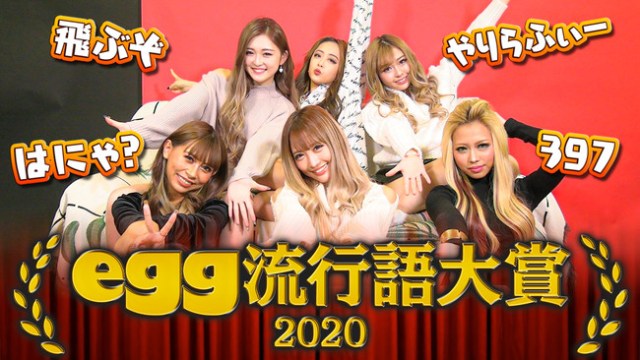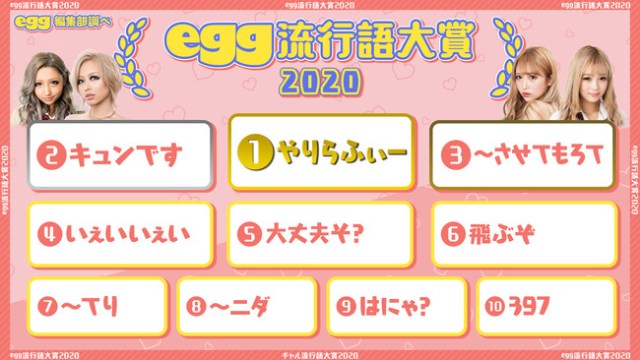
The number one pick is derived from the lyrics of a song that’s sung in neither Japanese nor English.
Alongside Japan’s annual Kanji of the Year selection, we always look forward to the various year-end lists detailing the trendiest Japanese buzzwords of the year. Part of the fun is to channel our inner teenagers to see just how attuned we are to the slang of today’s youth, but we inevitably end up lamenting the years that have taken their toll on our linguistic hipness.
Fashion magazine Egg, which hit the scene back in 1995 and became the premier guide for all the latest in Japanese street fashions and subcultures, recently released the results of their 2020 Buzzword Awards. The ten picks were selected after compiling results from 5,000 survey takers including Egg models, street models featured in the magazine, and Egg followers. This year, the words were overwhelmingly derived from and diffused through social media influencers including YouTubers and TikTokers.
Let’s see how familiar you are with the trendiest Japanese slang terms of this past year!
▼ Egg models count down the top picks
▼ The winners in Japanese
10. 397 (397)
In Japanese, the numbers 3-9-7 can be read as san-kyu-na, which sounds like an informal way of “hey, thanks” (サンキューな ) in Japanese (borrowed from the English) and is much faster to text. Just be sure to use it among close pals only–it isn’t appropriate to use with anyone older or of a higher status.
9. Hanya? (はにゃ?)
This one’s a cute interjection used when the speaker doesn’t know something or wants to play dumb. “Hanya? What do you mean Demon Slayer: Kimetsu no Yaiba the Movie: Mugen Train is now the third highest-grossing film ever in Japan?”
▼ Come to think of it, Nezuko often makes a puzzled hanya? kind of face.
Confused Nezuko because why not#DemonSlayer #nezuko pic.twitter.com/gJWackYS6E
— Dalola (@Dalolaart) March 11, 2020
8. ~nida (~ニダ)
Just like Japanese, the Korean language employs a number of different politeness levels that affect the formation of individual words. One such verb suffix used in super-polite deferential language contains ~nida at the end. Perhaps because it’s easily distinguishable even to those who don’t speak Korean, Japanese youth have adopted this suffix to add a Korean flair to any Japanese word. Ironically, the most polite form has now become a colloquialism in the process!
7. ~teri (~てり)
This structure is a corruption of the standard Japanese ~(shi)teru, a continuous verb form which indicates that someone is in the process of doing something. According to Japanese youth, why end your sentences with ru when ri sounds cuter? Test it out with a friend and see how you feel–ask them Nani shiteri? (“What are you doing?”) and maybe they’ll reply Gohan tabeteri (“I’m eating”).
6. Tobu zo (飛ぶぞ)
You know that feeling when something is so out-of-this-world delicious that you can’t even contain your excitement and imagine yourself blasting off on a gastronomic high? That’s the kind of situation that calls for tobu zo (“I’m gonna fly away”).
Interestingly, the use of the phrase was popularized by Riki Choshu, a retired professional wrestler who used it while eating some delicious scallops on a TV show in what is now an infamous video clip. While his visible reaction may have been a bit underwhelming, his choice of phrasing is now one for the record books.
▼ Listen for tobu zo at the 0:08 mark
5. Daijobu so? (大丈夫そ?)
This one’s a variation of Daijobu kana?, which is a soft way of asking “Are you okay?” E.g. “You just tried that new giant water bug gin? Daijobu so?”
4. Yeyyey (いぇいいぇい)
Just like in English, you can use this interjection when you and your friends are really excited about something. In Japanese it’s also become common to use it in place of kanpai when saying “cheers.”
3. ~sasete morote (~させてもろて)
There must be something really alluring to Japanese teens about trading one sound for another to make it “cuter.” This grammatical structure is a corruption of the standard Japanese ~sasete moratte which is tacked on to the end of a verb when asking someone else to do something for you. In the context of high school students, think of your romantic crush pleading to “study” together while using this phrasing and whether you’d have the willpower to resist.
2. Kyun desu (キュンです)
Kyunkyun in Japanese is a kind of onomatopoeia that refers to a sudden beating of the heart or the state of being choked up with emotion. Kyun, followed by the polite copula desu, is now used in combination to denote any such swoonworthy situation. The expression exploded in popularity after a song called “Poketto kara kyun desu” by Hirame was featured in an ever-expanding collection of TikTok videos including this one from a heartthrob fisherman. Also important–don’t forget to make finger hearts while you’re saying it!
▼ TikToks set to “Poketto kara kyun desu” by Hirame
1. Yarirafi~ (やりらふぃ〜)
At its core, this term refers to an energetic person who enjoys going to parties or the club, but it can also refer to a particular kind of fashion involving articles of clothing such as skinny jeans and tight T-shirts. Japanese youth use the phrase as a Twitter hashtag or in Instagram stories to describe any of the above. However, what’s most bizarre is the actual origin of the phrase from the upbeat Norwegian dance song “Chernobyl 2017” by Meland x Hauken (feat. Benjamin Beats). This song went viral at many high schools in Japan and its popularity only grew as more and more students filmed themselves dancing to it in TikTok videos.
The lyric in question is actually “Jeg vil at vi” which is sung at the beginning of each chorus. Apparently that phrase sounded like yarirafi~ to Japanese ears and has now taken on this whole new set of slang meanings half a world apart.
▼ Do you hear yarirafi~ at the 0:35 mark like a Japanese speaker? Also, check out the number of video comments in Japanese!
Does this ranking make you feel kyun desu? Or does it leave you scratching your head with a hanya? One thing’s for sure–Japanese youth are forces of nature when it comes to coining new expressions and we can’t wait to see what wacky linguistic expressions they come up with next.
Source: PR Times, YouTube/egg Channel
Images: PR Times
● Want to hear about SoraNews24’s latest articles as soon as they’re published? Follow us on Facebook and Twitter!
[ Read in Japanese ]


 Keeping up with the kids: Japanese high schoolers’ most popular slang of Spring 2022
Keeping up with the kids: Japanese high schoolers’ most popular slang of Spring 2022 The top 10 poses trending with Japanese teens, as demonstrated by a couple of ossan
The top 10 poses trending with Japanese teens, as demonstrated by a couple of ossan Japan’s second-largest convenience store chain changes service policy for sake of foreign workers
Japan’s second-largest convenience store chain changes service policy for sake of foreign workers Japan fans call Rugby World Cup player Luke Thompson “kawaii” for the way he speaks Japanese
Japan fans call Rugby World Cup player Luke Thompson “kawaii” for the way he speaks Japanese Learn Japanese schoolgirl vocabulary with new video from Line【Video】
Learn Japanese schoolgirl vocabulary with new video from Line【Video】 Seaside scenery, history, and so many desserts on Yokohama’s Akai Kutsu【Japan Loop Buses】
Seaside scenery, history, and so many desserts on Yokohama’s Akai Kutsu【Japan Loop Buses】 Japanese city loses residents’ personal data, which was on paper being transported on a windy day
Japanese city loses residents’ personal data, which was on paper being transported on a windy day Do Hi-Chew-flavor Hi-Chews have a reason to exist?【Taste test】
Do Hi-Chew-flavor Hi-Chews have a reason to exist?【Taste test】 Suntory x Super Mario collaboration creates a clever way to transform into Mario【Videos】
Suntory x Super Mario collaboration creates a clever way to transform into Mario【Videos】 Foreigner’s request for help in Tokyo makes us sad for the state of society
Foreigner’s request for help in Tokyo makes us sad for the state of society Haku is…Chihiro’s dead brother? Studio Ghibli fans blown away by Spirited Away theory
Haku is…Chihiro’s dead brother? Studio Ghibli fans blown away by Spirited Away theory Mt. Koya planning to instate visitor’s tax to cope with huge tourist numbers
Mt. Koya planning to instate visitor’s tax to cope with huge tourist numbers Red light district sushi restaurant in Tokyo shows us just how wrong we were about it
Red light district sushi restaurant in Tokyo shows us just how wrong we were about it Osaka governor suggests lowering voting age to 0 to curb population decline
Osaka governor suggests lowering voting age to 0 to curb population decline Harajuku Station’s beautiful old wooden building is set to return, with a new complex around it
Harajuku Station’s beautiful old wooden building is set to return, with a new complex around it McDonald’s new Happy Meals offer up cute and practical Sanrio lifestyle goods
McDonald’s new Happy Meals offer up cute and practical Sanrio lifestyle goods Japanese ramen restaurants under pressure from new yen banknotes
Japanese ramen restaurants under pressure from new yen banknotes French Fries Bread in Tokyo’s Shibuya becomes a hit on social media
French Fries Bread in Tokyo’s Shibuya becomes a hit on social media Studio Ghibli releases new action figures featuring Nausicaä of the Valley of the Wind characters
Studio Ghibli releases new action figures featuring Nausicaä of the Valley of the Wind characters New private rooms on Tokaido Shinkansen change the way we travel from Tokyo to Kyoto
New private rooms on Tokaido Shinkansen change the way we travel from Tokyo to Kyoto Tokyo Tsukiji fish market site to be redeveloped with 50,000-seat stadium, hotel, shopping center
Tokyo Tsukiji fish market site to be redeveloped with 50,000-seat stadium, hotel, shopping center Beautiful Ghibli sealing wax kits let you create accessories and elegant letter decorations【Pics】
Beautiful Ghibli sealing wax kits let you create accessories and elegant letter decorations【Pics】 Studio Ghibli releases Kiki’s Delivery Service chocolate cake pouches in Japan
Studio Ghibli releases Kiki’s Delivery Service chocolate cake pouches in Japan New definition of “Japanese whiskey” goes into effect to prevent fakes from fooling overseas buyers
New definition of “Japanese whiskey” goes into effect to prevent fakes from fooling overseas buyers Our Japanese reporter visits Costco in the U.S., finds super American and very Japanese things
Our Japanese reporter visits Costco in the U.S., finds super American and very Japanese things All-you-can-drink Starbucks and amazing views part of Tokyo’s new 170 meter-high sky lounge
All-you-can-drink Starbucks and amazing views part of Tokyo’s new 170 meter-high sky lounge More foreign tourists than ever before in history visited Japan last month
More foreign tourists than ever before in history visited Japan last month New Pokémon cakes let you eat your way through Pikachu and all the Eevee evolutions
New Pokémon cakes let you eat your way through Pikachu and all the Eevee evolutions Disney princesses get official manga makeovers for Manga Princess Cafe opening in Tokyo
Disney princesses get official manga makeovers for Manga Princess Cafe opening in Tokyo Sales of Japan’s most convenient train ticket/shopping payment cards suspended indefinitely
Sales of Japan’s most convenient train ticket/shopping payment cards suspended indefinitely Sold-out Studio Ghibli desktop humidifiers are back so Totoro can help you through the dry season
Sold-out Studio Ghibli desktop humidifiers are back so Totoro can help you through the dry season Japanese government to make first change to romanization spelling rules since the 1950s
Japanese government to make first change to romanization spelling rules since the 1950s Ghibli founders Toshio Suzuki and Hayao Miyazaki contribute to Japanese whisky Totoro label design
Ghibli founders Toshio Suzuki and Hayao Miyazaki contribute to Japanese whisky Totoro label design Doraemon found buried at sea as scene from 1993 anime becomes real life【Photos】
Doraemon found buried at sea as scene from 1993 anime becomes real life【Photos】 Tokyo’s most famous Starbucks is closed
Tokyo’s most famous Starbucks is closed One Piece characters’ nationalities revealed, but fans have mixed opinions
One Piece characters’ nationalities revealed, but fans have mixed opinions We asked a Uniqlo employee what four things we should buy and their suggestions didn’t disappoint
We asked a Uniqlo employee what four things we should buy and their suggestions didn’t disappoint Princesses, fruits, and blacksmiths: Study reveals the 30 most unusual family names in Japan
Princesses, fruits, and blacksmiths: Study reveals the 30 most unusual family names in Japan The Japanese you learn at school vs the Japanese used in Japan【Video】
The Japanese you learn at school vs the Japanese used in Japan【Video】 Japanese fisherman becomes TikTok heartthrob, shares cute dance videos while working at sea
Japanese fisherman becomes TikTok heartthrob, shares cute dance videos while working at sea Words they don’t teach you in Japanese class: How to say “straw man” in Japanese
Words they don’t teach you in Japanese class: How to say “straw man” in Japanese Jennifer Connelly sang a Japanese song that became a number one hit single in Japan 【Video】
Jennifer Connelly sang a Japanese song that became a number one hit single in Japan 【Video】 Our Japanese writer introduces some handy phrases so you too can speak the Kansai dialect!
Our Japanese writer introduces some handy phrases so you too can speak the Kansai dialect! Japanese students despair over the many, MANY ways you can describe a dead flower
Japanese students despair over the many, MANY ways you can describe a dead flower Ham sandwich! Japanese netizens are loling at these nonsense car decals
Ham sandwich! Japanese netizens are loling at these nonsense car decals 11 different ways to say “father” in Japanese
11 different ways to say “father” in Japanese Textbook gives Chinese otaku Japanese lessons with a side of anime girls and dialogue
Textbook gives Chinese otaku Japanese lessons with a side of anime girls and dialogue Pikachus perform classical Japanese dance routine for Japan’s most famous cherry blossom song【Vid】
Pikachus perform classical Japanese dance routine for Japan’s most famous cherry blossom song【Vid】 “Sausage bread boys” – The heavy-set men set to become Japan’s most eligible bachelors
“Sausage bread boys” – The heavy-set men set to become Japan’s most eligible bachelors Mr. Sato falls for the biggest egg sandwich he’s ever seen…but what does it look like inside?
Mr. Sato falls for the biggest egg sandwich he’s ever seen…but what does it look like inside? Foreign English teachers in Japan pick their favorite Japanese-language phrases【Survey】
Foreign English teachers in Japan pick their favorite Japanese-language phrases【Survey】 Lingo mambo! Spanish YouTuber teaches us 14 Taiwanese pet phrases【Video】
Lingo mambo! Spanish YouTuber teaches us 14 Taiwanese pet phrases【Video】 Japanese drum game Taiko no Tatsujin celebrates 20 years with TikTok version, tournament, and more
Japanese drum game Taiko no Tatsujin celebrates 20 years with TikTok version, tournament, and more What do North Korean idol singers sound like? Like this 【Videos】
What do North Korean idol singers sound like? Like this 【Videos】 Canadian learns to speak proper Japanese by becoming comedian, pouring tea for his master
Canadian learns to speak proper Japanese by becoming comedian, pouring tea for his master
Leave a Reply